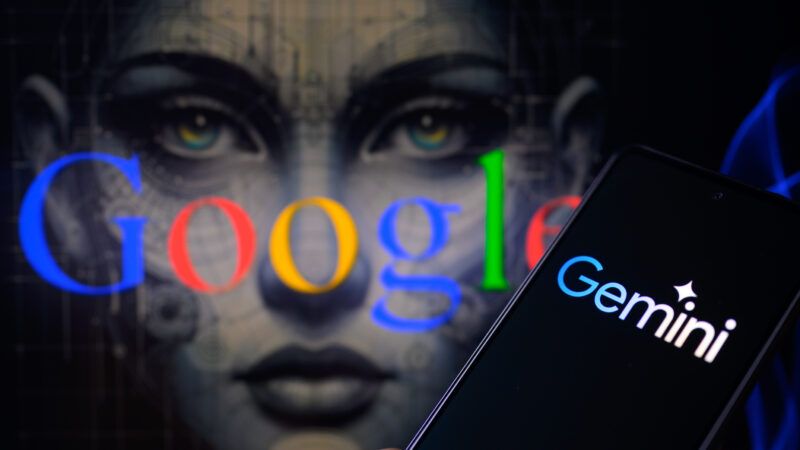News Publishers Try To Sic the Government on Google AI
A journalism industry trade group is asking the federal government to thwart a tech tool that could make news publishing less profitable.

Google's pivot to artificial intelligence has news publishers freaking out—and running to the government.
"Agency intervention is necessary to stop the existential threat Google poses to original content creators," the News/Media Alliance—a major news industry trade group—wrote in a letter to the Department of Justice (DOJ) and the Federal Trade Commission (FTC). It asked the agencies to use antitrust authority "to stop Google's latest expansion of AI Overviews," a search engine innovation that Google has been rolling out recently.
You are reading Sex & Tech, from Elizabeth Nolan Brown. Get more of Elizabeth's sex, tech, bodily autonomy, law, and online culture coverage.
Disrupting the Search Status Quo
Google's plain old top-of-page links to news outlets or other informational sites are disappearing in many searches. Now much of this prime search-results real estate is taken up by what Google is calling AI Overviews.
Overviews offer up short, AI-generated summaries paired with brief bits of text from linked websites. (If you haven't used Google in a while, try it now and see for yourself.)
The results have been far from perfect (would you like some glue with that pizza?) and leave a lot of room for skepticism and interpretation. (This past weekend, Overviews fed me seemingly contradictory advice about baby fevers within a two-paragraph span.) But that's also often true of what you would find from an old-school list of links and snippets. And Google has been inching away from link-prominent results for a while now, featuring brief bits of (non-AI-generated) content in response to many search queries and in the form of Q&A text throughout link pages. So the recent appearance of AI-generated text answers wasn't even immediately noticeable to me.
But newspaper and magazine publishers sure are noticing.
Overviews give "comprehensive answers without the user ever having to click to another page," the The New York Times warns. And this worries websites that rely on Google to drive much of their traffic.
"It potentially chokes off the original creators of the content," Frank Pine, executive editor of MediaNews Group and Tribune Publishing (owner of 68 daily newspapers), told the Times.
The emphasis should be on potentially—it's not at all clear yet how the change will affect traffic flows. "We do continue to see that people often do click on the links in AI Overviews and explore," Liz Reid, Google's vice president of search, told the Times. "A website that appears in the AI Overview actually gets more traffic" than a basic link does.
"Publishers said in interviews that it was too early to see a difference in traffic from Google since AI Overviews arrived," the Times reports.
But they still want to punish Google preemptively for daring (once again) to disrupt media business models in a way that news organizations don't like.
A Demand for Antitrust Action
In its letter, sent May 28, the News/Media Alliance asked the government to take action against Google's use of AI. The Alliance wants the agencies to investigate what it calls Google's "monopolistic misappropriation of publishers' content" and to use federal antitrust law "to stop Google's latest expansion of AI Overviews."
It's always amazing to me how an industry so supportive of civil liberties that benefit them (such as freedom of the press) can be so indifferent to freedom in other realms. Here we have a journalism industry trade group asking the federal government simply to shut down a tech tool that might make publishing less profitable.
"Google is…starving publishers of traffic and creating conditions that encourage users to remain on its platform instead of clicking through to get the information directly from the original content creators," the News/Media Alliance complained in a press release.
But publishers have no right to eyeballs—and especially no right to have Google send eyeballs their way.
Imagine if department stores of yore demanded the government intervene to stop shopping malls or big-box retailers from siphoning off customers. Or if book publishers demanded intervention to stop movie theaters from stealing readers' leisure time. Most people would recognize such demands as ludicrous, because we all understand that existing entertainments and platforms have no right to demand an unwavering audience for all time.
Media websites have gotten used to Google searches sending them a certain amount of traffic. But that doesn't mean Google is obligated to continue sending them that same amount of traffic forever—and no amount of handwringing about Google AI citing or linking to websites will change that.
"Google is abusing its power in search to use publishers' content—without payment or permission—to power Google AI Overviews and its other GAI products to exclude competition," the News/Media Alliance letter argues. But there's an easy way for a website to opt out of this: don't be indexed by Google, or provide snippets for it to use.
A website not optimized to show up in Google results, or set to show up as just a link with no accompanying text, will not be "misappropriated" by Google's AI tools. The Alliance admits as much in its letter, noting that publishers could opt out of AI Overviews by "opt[ing] out of search distribution." But opting out would render websites "effectively invisible to large swaths of readers," it states.
Of course, websites can find readers by people visiting their sites directly, coming from direct links, clicking through from social media and news aggregators, and other non-search ways. But being accessible via Google benefits publishers greatly, so they're hesitant to forego that in order to opt out of AI Overviews.
Now, it's certainly understandable that publishers want to be able to use Google in a way that benefits them without any tradeoffs. But that isn't a realistic business model and it isn't a realistic demand.
Reaping and Sowing
It is possible that Google's pivot to AI was hastened by how hostile news media has been to tech companies.
We've seen publishers demanding that search engines and social platforms pay them for the privilege of sharing news links, even though this arrangement benefits publications (arguably more than it does tech companies) by driving traffic. News outlets from the U.S. to Australia and Canada have been trying to orchestrate what amounts to a link tax, which would charge these tech companies for linking to them. (No matter how many times I type that, I will not get over how dumb it is.)
And we've seen a constant stream of complaints from news media about the kinds of articles that search engines and social platforms feature—that they're too partisan, contain too much misinformation, etc.
Is it any wonder that when given the opportunity to downplay news results, these tech companies have taken it?
Antitrust Means Whatever Government Wants It To Mean
In a more sane world, Google's pivot to AI would mean less antitrust madness.
Part of the argument for using antitrust law against Google has been that its search engine was a monopoly that could never be disrupted. But AI tools looked like they could be a threat to Google's typical search, in a way that lawmakers and regulators did not predict. Once again, technological dynamism does a better job disrupting old paradigms than regulatory or legal action.
Rather than simply let other companies win out in the AI arms race, Google started integrating artificial intelligence into its search engines. We have yet to see how this turns out in the long run. The important point is that Google didn't ask the government to intervene to save the search engine model of yore; it innovated.
Newspapers and publishing outlets could learn a lot from this. Alas, they seem more keen on leveraging the Biden administration's anti-tech antitrust agenda to their benefit.
The administration doesn't seem to see Google's disruption by AI as a strike against its theories of search-engine monopoly. It's just revising its talking points: Now it wants to investigate AI content deals, according to Jonathan Kanter, who runs DOJ's antitrust division.
At a recent conference at Stanford, PYMENTS reports, "Kanter asserted that the Justice Department has the authority to take action under the antitrust principle of monopsony, which occurs when a buyer in a supply chain wields excessive power, leading to reduced prices and disincentivizing production. He warned that without competition to adequately compensate creators, AI companies could exploit monopsony power to an unprecedented extent, with severe consequences."
Rather than reflect on the way artificial intelligence is challenging their notions about tech monopolies, officials seem determined simply to steamroll ahead, pivoting their antitrust agenda to whatever new tech comes their way.
More Sex & Tech News
• A male birth control gel is showing promising results in trials.
• On AI bots and intimacy.
• Facebook rolls out the AI assistant no one wanted.
• "It sure seems like the AI hype train is just leaving the station, and we should all hop aboard," writes Christopher Mims at The Wall Street Journal. "But significant disappointment may be on the horizon, both in terms of what AI can do, and the returns it will generate for investors." AI tools are getting better slower, they are "wildly expensive" to run, and "there appear to be fewer applications than originally imagined for even the most capable of them."
Today's Image
There was no Sex & Tech newsletter last week because I was busy moving into this little slice of suburbia:



Show Comments (14)